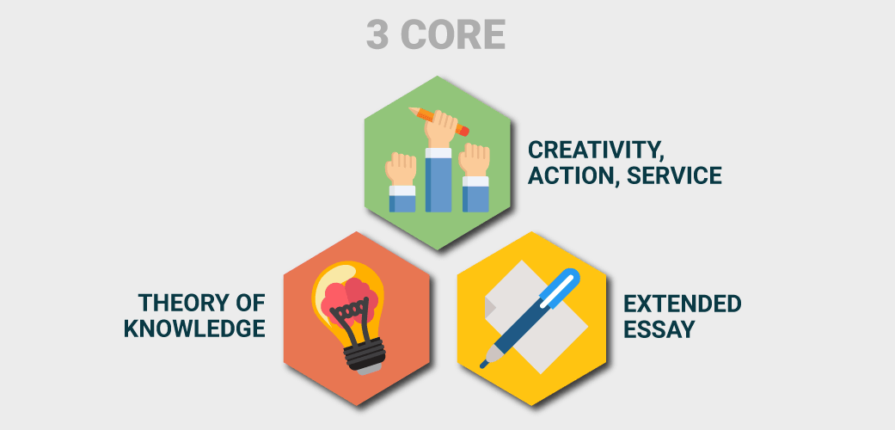The International Baccalaureate® (IB) Diploma Programme (DP) centres on the DP core. Three components make up the core, which are studied alongside individual subjects and throughout a student’s time in the DP.
- Theory of knowledge, allows students to explore and reflect on the nature of knowledge. It allows students to inquire into ‘how we know what we know’. Students do a presentation and write an essay as a part of their evaluation.
- The extended essay, enables students to choose, conduct and write a 4,000-word research paper in a subject and topic of their choice through independent, self-directed research.
- Creativity, activity, service, is the experiential part of the IBDP core that promotes confidence and commitment, by encouraging students to lead, participate and collaborate in meaningful activities in the three strands.
What is the Theory of Knowledge?
Theory of knowledge (TOK) is assessed through an oral presentation and a 1,600 word essay.
TOK is one of the core components of the International Baccalaureate® (IB) Diploma Programme (DP), and is mandatory for all students.
Through TOK, the students inquire into how knowledge is acquired and claimed across different disciplines. In simple terms they ask ‘how do we know what we know?’
What Will Students Learn in the Theory of Knowledge Curriculum?
Students at AAIS are encouraged to examine their ideas and understanding, reflect on their knowledge and prejudices, through a process of questioning at every stage. The classes allow students to express their viewpoints and share their perspectives in a non-judgemental environment on a range of topics across disciplines. This allows them to make meaningful connections to their IB subjects and also critically evaluate the sources and process of how the claims are made in these subjects.
Through these interesting classroom engagements, students gain a better understanding of their own personal biases and assumptions and ultimately start appreciating the diverse and rich perspectives that exist, thus allowing them to think critically and apply their knowledge in newer contexts.
TOK Structure and Assessment Criteria
The TOK course consists of 3 interconnected parts.
| Core themeKnowledge and the Knower. Reflecting on themselves as knowers and thinkers, students consider all the communities of knowers and thinkers they are a part of. |
| Areas of knowledgeStudents explore five distinct knowledge areas: History; Natural Sciences; Human Sciences, Mathematics and the Arts. |
| Optional themesThe teacher and the students together choose two of five themes to do an in-depth look into among the following options provided by the IB: knowledge and technology; knowledge and language; knowledge and religion; knowledge and politics and knowledge and indigenous societies. Each of these themes are relevant to the complex global society we live in and play a critical role in influencing and shaping our knowledge and perspectives. |
Students are evaluated based on two tasks that demonstrate their understanding of the course
| TOK Exhibition Students choose a topic and connect different examples from the wider world to show how knowledge is formed .Students are expected to do a 900-word reflection writing which is evaluated internally at School and moderated by an IB examiner. |
| TOK EssayBased onthe titles provded by IB, students choose one single title to produce a 1,600 word TOK essay. This formal written paper is evaluated and graded by an external IB Examiner. |
Final TOK grades are calculated on a scale from A-E. The essay constitutes two-third (67%) of the final TOK grade, while the exhibition accounts for one-third (33%).
The grades obtained in the Extended Essay and the TOK may contribute up to 3 points toward the diploma score based on a matrix.
What is Expected of the Student When Getting Started?
As they begin TOK, students are expected to:
Be open-minded
Compare knowledge across disciplines
Consider how they use the different ways of knowing – emotion, language, reason and sense perceptions, to gain knowledge
Recognise how personal and cultural views impact the knowledge-acquisition process
What is the Extended Essay?
Extended Essay (EE) is assessed through the submission of a 4,000-word independent research project submitted to the IB.
Extended Essay is one of the core components of our International Baccalaureate Diploma Programme.
At AAIS, students are given an opportunity to explore subjects and topics that interest them. This component provides an opportunity and helps students to prepare for undergraduate research. Students can pursue Extended Essay topics related to one of the six IB DP subject groups, or take an interdisciplinary approach. Students identify and work with a Supervisor who guides them through the research process.
The Extended Essay provides students with experience in:
- Formulating research questions
- Exploring topics that are more meaningful to them
- Communicating ideas
- Developing arguments
Preparing them towards research in their undergraduate study.
How Do Students Prepare for the Extended Essay?
What is the Purpose of the Extended Essay?
The extended essay provides an opportunity
- To prepare towards undergraduate research
- For students to explore a topic of personal interest in their chosen subject .
Through the process of working on the extended essay, the students develop the capacity to analyze, synthesize and evaluate knowledge.
What is the Significance of the Extended Essay?
The Extended Essay is placed in the Core of the IB DP as it aims to equip students with necessary skills that are needed for the next stage of their education and further life. These skills include:
Engage in independent research with intellectual initiative and rigour; develop research, thinking, self-management and communication skills; and. reflect on what has been learned throughout the research and writing process
- Research Skills
- Analytical Skills
- Critical thinking
- Writing skills
- Planning and Organizing
- Time management
What is the Significance of the Extended Essay?
A study conducted at the University of Virginia, USA, reported that Diploma Programme graduates felt more prepared to complete research-orientated coursework than their counterparts who took Advanced Placement courses. DP graduates also reported a greater likelihood to conduct subsequent research, citing it as critical to their future success.
According to DP graduates at two UK universities, completing the Extended Essay sharpened their critical and independent thinking skills. In Canada, IB graduates indicated higher ratings than their non-IB peers on self-managed inquiry-based learning. They also noted enhanced reading, writing, organisational and analytical skills.
What is the Format of the Extended Essay?
The entire process of Extended Essay starts with the introduction to this component and what it entails. The recommended number of hours for Extended Essay is 40 hours but students do spend more time on this as their interests are piqued when they delve deeper into their topic of interest. As a part of the process the students also participate in three reflections with their Supervisor and viva voce at the end of the submission.
How is the Extended Essay Graded?
The IB Extended Essay is graded by an external examiner according to established criteria on a scale of 0-34. To complete the project successfully, students must receive a grade of D or higher. The grades obtained in the Extended Essay and the TOK may contribute up to 3 points toward the diploma score based on a matrix. Some important evaluation criteria include:
- Criteria A: Focus and method
- Criteria B: Knowledge and understanding
- Criteria C: Critical thinking
- Criteria D: Presentation
- Criteria E: Engagement
What is Creativity, Activity, Service (CAS)?
Creativity, Activity, Service (CAS ) is one the Core components of the IBDP along with TOK and EE.
At AAIS, Service Learning is central to the vision and mission of experiential learning. Hence the Creativity, Activity, Service (CAS ) is encouraged and emphasised through the years of learning at AAIS. CAS provides opportunities for students to take on new challenges, cultivate new and existing skills and collaborate with their peers to serve the larger community. This is inculcated right form the Primary YEars and students take part in projects such as animal welfare, fund raising, volunteering with NGOs for a cause, collection drives and many more. Students are encouraged to look for opportunities throughout their years in Primary and Middle School take on projects that they resonate with and believe in.
At AAIS, the students are encouraged to take on projects from a wide array. These student-initiated projects lead to high levels of engagement and foster a sense of purpose and fulfilment. Students reflect on their experiences and learnings and gain insights that prepare them for being sensitive, empathetic and compassionate leaders.
Creativity: are those experiences that relate to creative thinking. Students take up projects in the creative arts and allied fields that allows them to explore their original thinking and expression. Forms of expression may include visual and performing arts, crafts, design, culinary arts, writing, film and many more. Students are encouraged to push their boundaries and explore newer areas in this strand that defines newer dimensions.
Activity: To complement the academic rigour of the IB DP, this strand allows students to indulge in physical exercises that contribute to active living. The students understand and adopt healthy habits through individual and team sports, aerobic exercise, dance, outdoor recreation, fitness training, and any other form of physical exertion that purposefully contributes to a healthy lifestyle and physical well-being. At AAIS all students participate in physical activity through their regular timetabled Physical Education classes.
Service: This strand ensures that students undertake voluntary work to make a meaningful contribution to their local and global communities. By involving in service projects the students develop and apply their self-management and social skills in real-life situations that involve decision making, problem-solving, taking intitiatives, responsibility and accountability.Over time, students become more self-aware and learn that the rights, dignity and autonomy of all those involved are respected, thu becoming developing international-mindedness.
How Does CAS Work?
Students are exposed to a few School-based projects to initiate them into this component. They then come up with ideas and plan projects, choose their Supervisor, work on the plans and reflect on their experiences. Eahpf these projects map to the CAS Learning Outcomes defined by the IB. Students may also come up with projects that align to their IB DP subjects and teachers assist them in ensuring the appropriate CAS experiences are linked in their teaching.
Students may use any format to record their reflections of the activities they undertake and show evidence of these experiences also. The portfolio allows them to reflect on their overall learning and growth through CAS presentations that are built into their periodic reviews.
Some interesting projects undertaken for CAS are here:
Namma Ooru foundation
Baskara STreet clean up
Science through Football
CAS promotes students’ emotional, physical, social and intellectual development.
The students are expected to do a minimum of 18 months of continuous CAS activities across all the three strands. Unlike the TOK and EE, CAS is a non-assessed component of the IB but all students must complete the requirements as expected by the IB.




